Our board members Marius Wanders and Johannes Trimmel attended on February 29th the launch seminar of the ‘EuroBarometer 441′ about the European Year for Development 2015. The launch organised by the European Commission revealed the results of the year as well as the perception of European citizens on development issues. Read Marius’ story below!
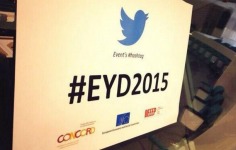
It was a crisp end-of-winter Monday. The calendar said February 29th: Leap day during a leap year. Some early morning moaners on social media had already exasperated: “If you have to have one extra day once every four years, does it really have to be a Monday???”. Chill out, folks, carpe diem.
Thanks to the beautiful weather, I actually quite enjoyed my early morning drive through the Monday morning rush hour from my home in the Netherlands to Brussels, and in just under three hours I did manage to arrive more or less on time at Tour & Taxis. I went there because I had been invited by the European Commission as a special guest at their first ever joint staff seminar of DG DEVCO (International Cooperation & Development and DG NEAR (Neighbourhood and Enlargement Negotiations). It was during this seminar that EU Commissioner for Development would unveil some of the highlight findings from the recent Eurobarometer survey, held at the end of the European Year 2015 for Development.
As it was the first time I had ever been invited to an event like this, I did not quite know what to expect, and I certainly did not expect what I saw when I walked in. There were at least 1,000 (but probably more) staff members of the two DGs in question as well as from the EU delegations and other EU related staff. This EC staff seminar is an annual event where at least a thousand DEVCO and NEAR staff from Headquarters and Delegations come together to discuss priorities and hear their management´s views on latest developments in their work.
The morning programme featured speeches and short Q&A sessions with the two respective Commissioners: Commissioner Johannes Hahn (DG NEAR) and Commissioner Neven Mimica (DG NEAR).
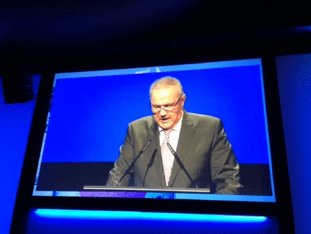
The key element of the morning programme was the unveiling of the results of the EYD2015 campaign and thus underlining that concerted information campaigns can make a difference in the opinion of European citizens.
It fell upon Stina Soewarta to present some key findings of the recent post-EYD2015 Eurobarometer survey. She is the Head of Unit for Transparency & Communications in DG DEVCO and had been in charge of all the practical organisation of the European Year and the communication aspects. While a number of men (including myself) are laying claim on the distinction of having been the “Godfather of the European Year”, nobody disagrees that Stina was the “fairy Godmother” of that year, the woman who nurtured it and made it grow.
The new Eurobarometer survey that Stina presented (special Eurobarometer 441 of 29 February 2016) was meant to be an instrument to measure the extent to which the goals of the European Year for Development had been achieved. These goals included increasing the awareness of citizens about how EU development aid works, as well as how and where development money is spent. Development aid and the plight of developing countries had also been brought into focus in 2015 with the escalating migrant and refugee crisis. In this context, this survey investigates Europeans awareness of, and opinions about a range of development related topics.
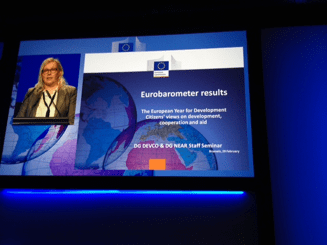
The survey was taken towards the end of the European Year and followed a similar survey taken just before the beginning of the European Year (special Eurobarometer 421 of January 2015). This way it became possible to directly compare opinions and perceptions of EU citizens just before and just after the European Year and thereby observe if and to what extent these had changed under influence of the European Year. The full Eurobarometer survey report consists of the main report and 30 annexed factsheets (one for EU28 highlights, one about Young People and 28 national member states factsheets). Stina presented some quite encouraging highlights of survey results.
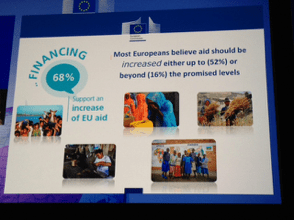
Following the presentation of this report, a panel of experts was invited on the stage to comment on some of the survey findings. These included Charles Goerens MEP, one of the driving forces behind the European Year in the Parliament and the EP’s rapporteur on the European Year, representatives of the French and Spanish governments and ministries of development cooperation and last but not least CONCORD’s President Johannes Trimmel, representing civil society. The panel discussion was also moderated by Stina Soewarta.
One of the questions put to Johannes Trimmel was the invitation to share his views on the more and more important role that civil society plays in development policies. According to the survey more than half of Europeans agree that individuals can play a role in tackling poverty in developing countries, and one third are personally involved in helping developing countries, with donations to organisations, such as NGOs or charities, as the most common activity mentioned.
%
of European citizens support development
In his response, Johannes also briefly described three of the most successful civil society initiatives that had been taken by civil society, in terms of the extent to which these initiative truly mobilised huge numbers of citizens and engaged them in reflection and discussion about development. He also expressed concern for the recent developments in many member states of the Union regarding declining levels of ODA and he argued passionately to uphold the promises and commitments made by governments when the MDGs were adopted and reiterated when the Sustainable Development Goals were adopted, while at the same time warning that no ODA funding should be used for purposes other than strictly development purposes.
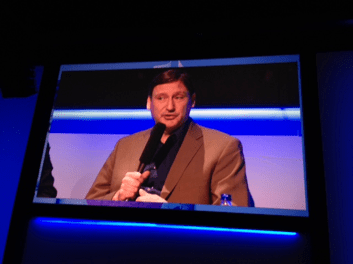
The last words of this very interesting part of the agenda of this huge EC staff seminar spotted that even at this level and in this gathering, one prominent issue of development still needs a lot of work: the issue of gender parity and gender equality.
Blogpost from Marius Wanders – Brussels/Rosmalen, 29 February 2016
